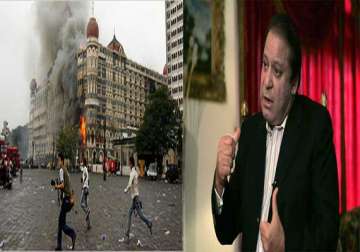New Delhi: Pakistani terrorists might sabotage new Prime Minister Nawaz Sharif's peace policy towards New Delhi by staging terror attacks in India, a new book by a Pakistani journalist warns.
Author Babar Ayaz also says in "What's Wrong With Pakistan" (Hay House India) that Sharif's peace overtures might suit the Pakistan Army for now as it wants to cut the tensions with India.
Sharif, the 364-page book says, wants to resurrect the peace process from where he had started with the former Indian prime minister Atal Bihari Vajpayee in 1999 before Pakistan's Kargil war sabotaged it.
"This might suit the military for the time being as it has been looking for ways to defuse tension with India and concentrate on the internal terrorist threats.
"But the jehadi groups and their Islamist supporters have already started opposing Sharif's peace policy with India. They are bound to sabotage such efforts by stepping up terrorist activities in India," the author says.
Ayaz's book is a comprehensive study of Pakistan since its birth in 1947 and the many crises it has faced, including an unending conflict about its own political and religious identity.
The journalist of over four decades says Pakistan "cannot be called a failed state" but makes it clear that the time has come to separate religion and politics in the world's only nuclear-armed Islamic state.
"Religion and politics have to be separated to check the sectarian strife and stop the state patronage to the Islamists.
"The jehadi organisations have to be wound up with a programme for the rehabilitation of their foot soldiers.
"Mosques and madrassas have to be closely monitored to stop them from spreading hatred against other sects and other countries," it added.
Whatever the nature of the Pakistani establishment, most Pakistanis want "a modern democratic state", the author says.
But Pakistan, which marked its 67th Independence Day Wednesday, "is still not sure of its identity", the book said.
Ayaz, founder of Pakistan's first independent public relations consultancy firm, says the country's rulers "have inculcated anti-Indian mindset because it justifies the religious nationalism".
Pakistan, he added, "has always relied on the non-state actors -- jehadi groups -- to make up for its military and economic resource deficiencies (vis-a-vis India)...
"Hatred against India and Hindus is part of syllabus in schools across Pakistan."
Today, the book adds, most Kashmiris, unlike their predecessors, do not want to join Pakistan.
"If at all, they want independence from India and Pakistan, preferring to be a land-locked independent country like Nepal.
"The unstable and terrorism-infested Pakistan is no more an attractive option for anybody in the region," Ayaz says in his book.
The author does not mince words on the deep connections between the Pakistani military-intelligence establishment and the many militant and other armed groups in the country. "No civilized country breeds and nurtures militant groups within its own boundaries. Pakistan has been doing it as an extension of its national security policy...
"In Pakistan, the jehadi organisations have created hurdles in the way of normalization of relations with India and other foreign policy objectives...
"As they are armed and trained to fight, the state has to either fight them or appease them. Both ways the country has to suffer destabilization."
Latest India News
